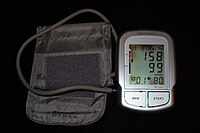
Photo from wikipedia
Hypertension affects approximately one third of the world’s adult population and is a major cause of premature death despite considerable advances in pharmacological treatments. Growing evidence supports the use of… Click to show full abstract
Hypertension affects approximately one third of the world’s adult population and is a major cause of premature death despite considerable advances in pharmacological treatments. Growing evidence supports the use of lifestyle interventions for the prevention and adjuvant treatment of hypertension. In this Review, we provide a summary of the epidemiological research supporting the preventive and antihypertensive effects of major lifestyle interventions (regular physical exercise, body weight management and healthy dietary patterns), as well as other less traditional recommendations such as stress management and the promotion of adequate sleep patterns coupled with circadian entrainment. We also discuss the physiological mechanisms underlying the beneficial effects of these lifestyle interventions on hypertension, which include not only the prevention of traditional risk factors (such as obesity and insulin resistance) and improvements in vascular health through an improved redox and inflammatory status, but also reduced sympathetic overactivation and non-traditional mechanisms such as increased secretion of myokines. In this Review, Lucia and colleagues discuss the epidemiological evidence on the benefits of major lifestyle interventions in the prevention and adjuvant treatment of hypertension, including regular physical exercise, body weight management, healthy diet, adequate sleep patterns, circadian entrainment and stress management. The authors also describe the main physiological mechanisms underlying these benefits. Strong evidence supports the benefits of regular physical activity and exercise for the prevention and management of hypertension. Reducing body weight to normal in individuals with overweight or obesity reduces the risk of hypertension, but further evidence is needed on the long-term efficacy of this strategy. Sodium intake restriction reduces blood pressure, particularly in patients with hypertension, and the Dietary Approaches to Stop Hypertension (DASH) diet is the most effective dietary approach to prevent hypertension and to reduce blood pressure in individuals with pre-hypertension or hypertension. Shift work, short sleep duration or poor sleep and other forms of circadian disruption might increase the risk of hypertension. Some forms of psychological stress, such as post-traumatic stress disorder, seem to be associated with a higher risk of hypertension, but strong evidence on the potential antihypertensive benefits of stress management techniques is lacking. In contrast to common antihypertensive medications, lifestyle interventions, especially exercise, reduce blood pressure through multisystemic and ‘non-traditional’ mechanisms (for example, not only by improving vascular health or reducing sympathetic overactivation).
Journal Title: Nature Reviews Cardiology
Year Published: 2020
Link to full text (if available)
Share on Social Media: Sign Up to like & get
recommendations!